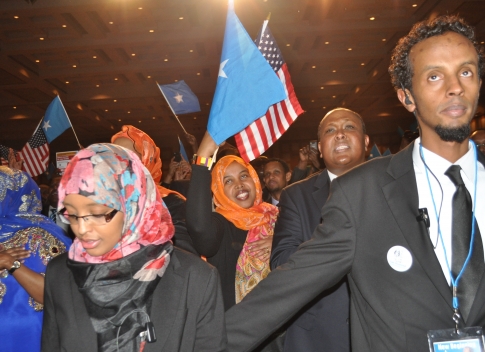The Somali diaspora is an untapped group with vast potential, and the Somali government would do well to better engage them in strategy development
While many professionals in the Somali diaspora play important roles in the development of Western countries and within international institutions, the question of an effective role for the diaspora continues to be a vexing one as the group continues to be poorly understood, and underutilized.
The diaspora pivot: There is a need for Somalia to pivot towards welcoming the power that many within the diaspora group could contribute to influencing policy, and to seek their support for their homeland or the wider region. While there are many who wish to return, there is ample evidence that most within the diaspora in positions of power and with access to influencers, are more interested in leveraging their positions in their countries of residence, rather than returning home to tinker with local initiatives.
Still, there is an urgent need for an articulated regional agenda, formed through dialogue between the region and the diaspora, which can be used as a blueprint for action and advocacy. This dialogue must touch on issues affecting Somalia, such as financial services, Security and sustainable development. Such a broad-based approach is necessary to map out successful engagement strategies for the effective navigation of the international agencies which touch and concern the Somalia.
The engagement of a national or wider Somali diaspora community to help lead advocacy and lobbying efforts could also add much-needed international nuances to home-built policies. Indeed, while the development of ministerial level positions within the country to lead diaspora outreach efforts has been a welcome step, there is a clear a lack of capacity within these offices to engage effectively at a global level.
Worse is the apparent lack of a plan as to what agenda items those in the external community could and should support as it relates to leveraging the access that they have. Stories are numerous of diaspora community members being shunned after reaching out to the government on issues — an indication of the apparent lack of trust and understanding of the power that this group has.
Interestingly, perceptions of diaspora linkages to local political actors may well be one of the reasons why the government may not engage with some on the outside, lending credence to the old adage that all politics are local.
The ideal for the Somalia government would be to see all programming as areas where the diaspora could bring value, be it technical support or advocacy. Diaspora engagement efforts could be an undertaking that contemplates tying all elements of a national plan together – be it health, financial services, tourism, security and or donor/development aid requests.
This type of exercise could also develop a pool of diasporic experts that could be attached to development projects, rather than the lamentable importation of consultants to Somalia who lack an understanding of the country and culture. Taking the argument one step further, regional agencies could be challenged to identify and create diaspora teams associated with key issues impacting Somalia, with these agencies entrusting those groups with the power to advocate on behalf of the regional space.
Ultimately, the power of the diaspora should be seen as transcending remittances and funding for local disaster relief efforts, and instead viewed through the lens of an untapped group seeking to play an active and positive role, by bringing their skills and access to the table.






comments (0)